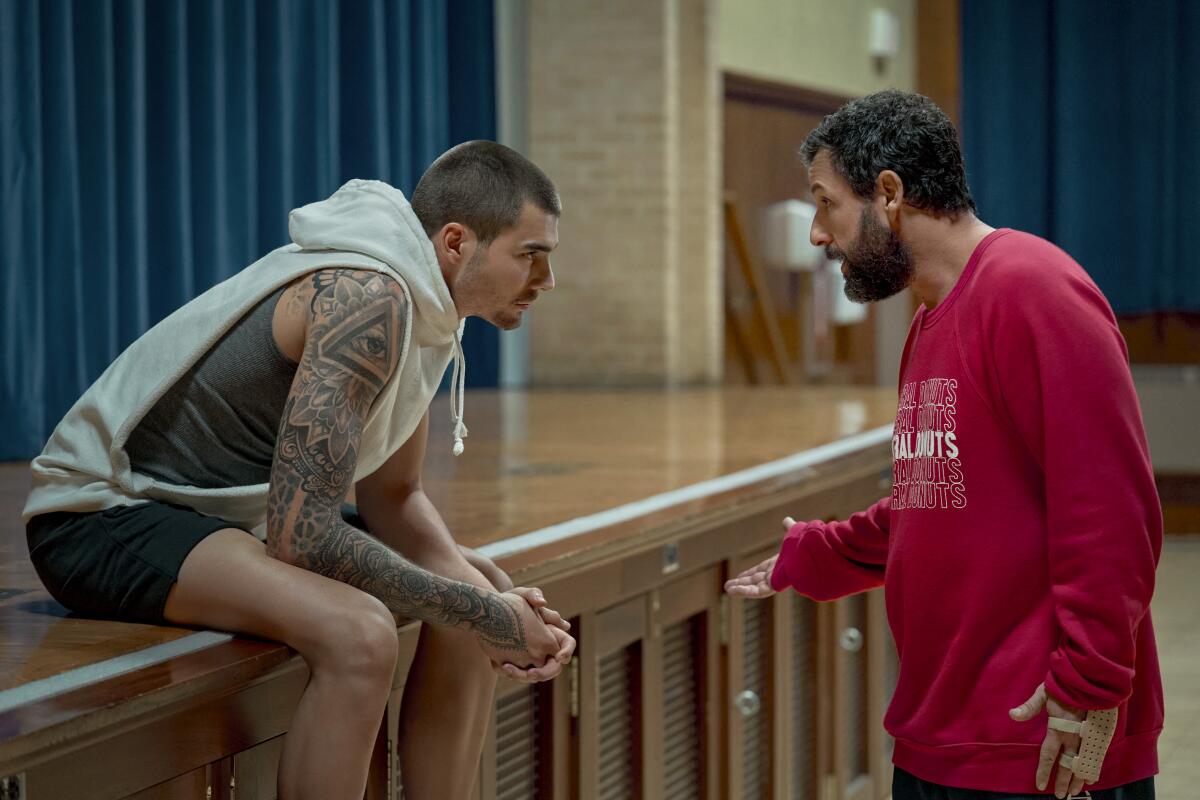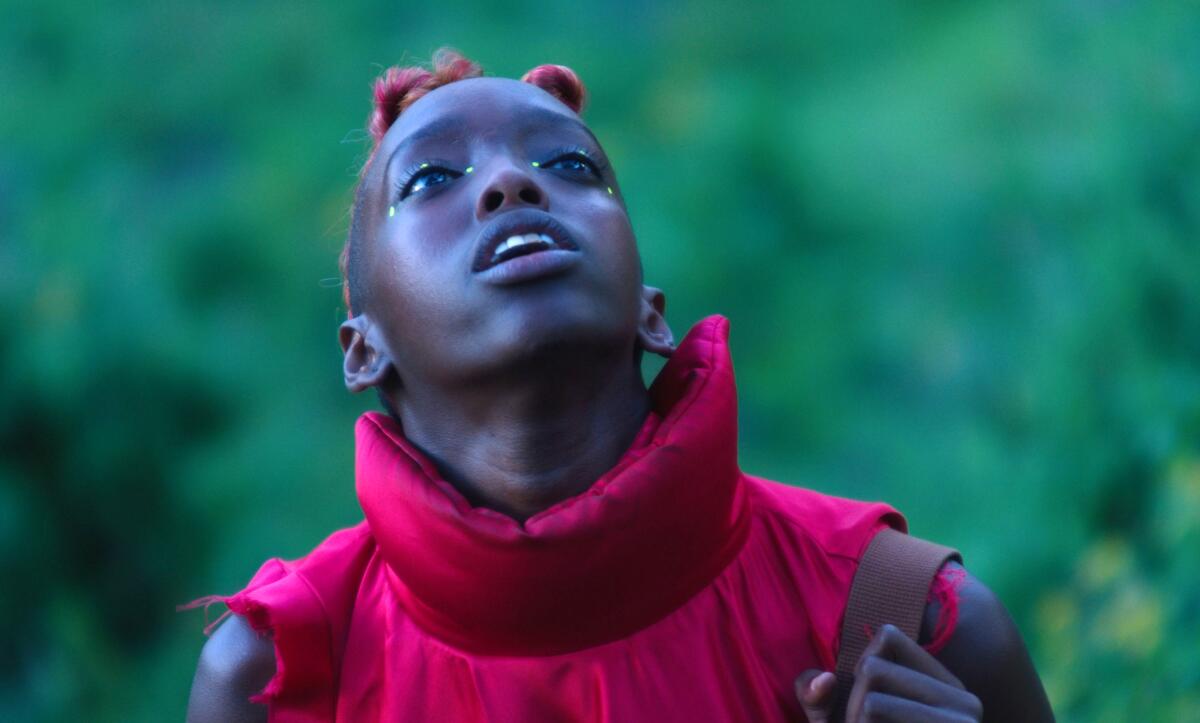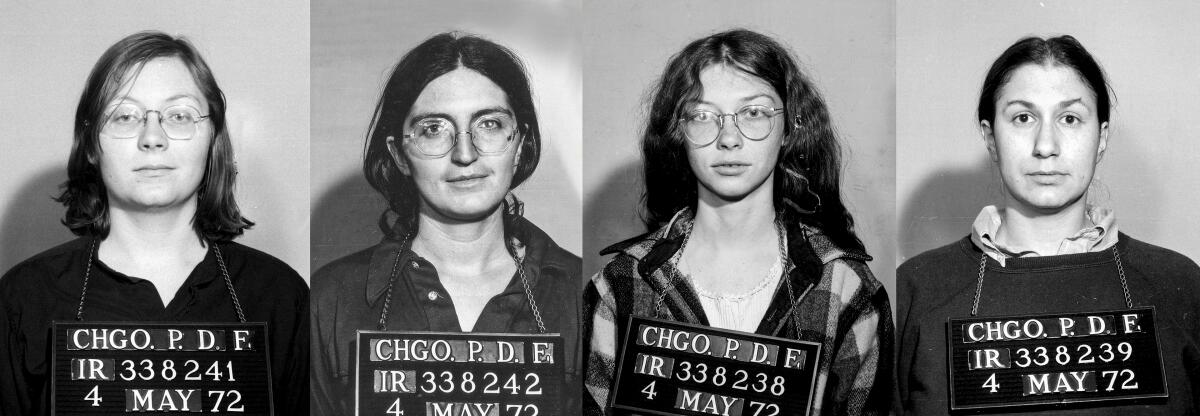Adam Sandler’s basketball dramedy ‘Hustle’ is a sweet surprise

- Share via
Hello! I’m Mark Olsen. Welcome to another edition of your regular field guide to a world of Only Good Movies.
Only good movies
Get the Indie Focus newsletter, Mark Olsen's weekly guide to the world of cinema.
You may occasionally receive promotional content from the Los Angeles Times.
An Elle Fanning tribute. The American Cinematheque will host a tribute to Fanning this weekend, with the actor appearing in person for a Q&A on Friday night. Though the tribute is ostensibly geared toward her dual Emmy campaigns for Hulu originals “The Great” and “The Girl From Plainville,” there will be screenings of two of her better film turns — in Max Minghella’s “Teen Spirit” and Nicolas Winding Refn’s “The Neon Demon.” (Neither film screens very often in theaters, but the chance to see “The Neon Demon,” in particular, is really something else.)
“The Deer Hunter” screening. On Tuesday, the Academy Museum will screen an archival 35-mm print of the Michael Cimino classic, winner of five Oscars including best picture and director. A harrowing depiction of war, the film is also an affectionately detailed portrait of small-town life and friendship. Screening as part of the academy’s “Branch Selects” series, “The Deer Hunter” was chosen by the academy’s executives branch, and one can’t help but wonder if the film’s mix of brutality and tenderness is indicative of how they view life in Hollywood.
“Brian and Charles” and Indie Focus. Also on Tuesday, we will have an Indie Focus screening event for the film “Brian and Charles,” followed by a Q&A with director Jim Archer, writer-actor David Earl and producer Rupert Majendie. The event will be our first at the Regal L.A. Live downtown. The movie is a delightful story of a man who builds his own robot companion, which is appropriate since the very first Indie Focus screening, 10 years ago (!) this summer, was of the movie “Robot & Frank,” a delightful story of a man and his robot companion.
Just as with this newsletter, it has been such a privilege to connect audiences with new films through the screening series.
Enjoying this newsletter? Consider subscribing to the Los Angeles Times
Your support helps us deliver the news that matters most. Become a subscriber.
‘Hustle’
Directed by Jeremiah Zagar from a script by Taylor Materne and Will Fetters, “Hustle” stars Adam Sandler as a scout for the Philadelphia 76ers NBA team. Longing to be a coach, he must find one key player. He thinks he’s found him in an unknown Spaniard, Bo Cruz (Juancho Hernangómez), whom he must train for his big league tryout. Filled with cameos by real NBA players, the film has a buoyant, electric energy and sincere performances. The film is in theaters and streaming now on Netflix.
For The Times, Justin Chang wrote, ”You can sense Zagar trying to push past convention, to transform a well-worn sports-movie staple into its own story rather than a shortcut. … [The film’s] interest in the injustices and compromises of the sports world run secondary, in the end, to its greater priority, which is to find a place for a star in a game he loves. I’m talking, of course, about Sandler, whose hustle is all the more persuasive here for its low-key restraint. He’s seldom worked harder, or more winningly, for an audience’s pleasure.”
I spoke to Zagar, who previously made the multiple Spirit Award nominee “We the Animals,” for a piece that will be publishing soon. After an initial conversation with Sandler, Zagar didn’t think the project was for him, but upon reflection, Zagar got excited about it, saying, “When I was a kid, I really loved sports movies. ... Now I find a kinship with what we do as filmmakers — in the plot lines, it’s all about the will. Do you have the will to do this thing that seems impossible? That’s what making films is like; they seem impossible. So I started to think about, ‘Oh, if I always wanted to do a sports movie and one just fell in my lap and it’s set in Philadelphia, where I’m from?’ And I thought, ‘Wouldn’t it be cool if we could cast real players?’ And Adam had mentioned that. And so I started to dream it up a little bit.”
For the New York Times, Amy Nicholson wrote, “Jeremiah Zagar, who directed ‘Hustle,’ cut his teeth making documentaries. Neither he nor the screenwriters Taylor Materne and Will Fetters romanticize the billion-dollar business of professional sports. They blot away any sheen of sentimentality. Success is tenuous; one mistake can derail a dream. … The naturalistic style shifts gears only in a centerpiece sequence that gamely tries to outdo ‘Rocky,’ with a training montage so aerobically exhausting that it pauses halfway through, as if to catch its breath.”
For Vanity Fair, Richard Lawson wrote, “Sandler does his once surprising, now familiar shaggy nice-guy thing—his somehow animated mutter running at a modest speed. … That’s prime territory for Sandler these days, who has over the years calmed his antic ‘SNL’ blare into thoughtful world-weariness. It can be thrilling to see him amp himself up again, as he did in the breakneck ‘Uncut Gems’ (which also featured basketball stars), but it is also a pleasure to watch him give in to the rumple of middle-age. He wears that shuffling decency well, giving off an approachable warmth that has, time and time again, drawn other talent toward him.”
For Polygon, Robert Daniels wrote, “By the final basketball game, when Bo must impress NBA executives enough to earn a contract, we all know where ‘Hustle’ will take us. But that doesn’t make it any less satisfying to arrive at the familiar destination. Between the sincerity shared by Sandler and Hernangomez and the high-level craft, ‘Hustle’ provides enough diversions to hoist our hearts high, even if we wind up craving more specificity from these characters and their travails.”

‘Neptune Frost’
Directed by Saul Williams and Anisia Uzeyman, “Neptune Frost” is a bold Afrofuturist sci-fi musical, coming to theaters after a strong run on the festival circuit, playing Cannes, Toronto, Sundance, New York and elsewhere. The film involves parallel stories of Matalusa (Bertrand Ninteretse) and Neptune (played by both Cheryl Isheja and Elvis Ngabo), who find liberation in the power of love. The film is in limited release and available via virtual cinemas.
For The Times, Katie Walsh wrote, “Set in Burundi, the sounds and images of ‘Neptune Frost’ are striking, but beyond its aesthetics, this is a film underpinned by a dense, revolutionary mythology. … Williams and Uzeyman’s radical vision of the future is rooted in the tactility and sensuality of the real and natural world. It comes from real pain, war, exploitation — and seeks to apply ancient wisdom to the present age of technology. That ethos extends to the film’s aesthetic, with practical filmmaking techniques employed to attain its futurist vision.”
For the New York Times, A.O. Scott wrote, “The plot of ‘Neptune Frost’ is loose and suggestive. This isn’t a tight, tidy allegory of capitalism and colonialism so much as a collage of vivid images, sounds and words that punch the movie’s themes like hashtags. Williams and Uzeyman marry anarchist politics with anarchist aesthetics, making something that feels both handmade and high-tech, digital and analog, poetic and punk rock.”
For Variety, Lisa Kennedy wrote, “Even though ‘Neptune Frost’ teases viewers with the story of two characters who head out at the movie’s start, it resists time and again the demand to make linear sense. It’s not about the traditional hero’s journey so much as the hero’s dream. … ‘Neptune Frost’ challenges or — to borrow a word from one of the characters in a dream — ‘hacks’ the interpretive pathways movie audiences have grown so accustomed to navigating. It does not court our understanding, it does not make following easy, but it does whisper to us and spark connections. In that way, it is like a dream: fitful, feverish, promising.”
For the Hollywood Reporter, Jourdain Searles wrote, “This Afro-futurist science fiction musical is an expansive piece of art, with eye-popping color and a beautiful, dynamic cast of young Black performers. … ‘Neptune Frost’ utilizes everything the medium of film has to offer — visually, sonically, and emotionally. Every moment requires the full senses of the viewer, challenging our rapidly deteriorating attention spans. Gorgeously photographed, the Rwanda-set film requires the largest screen possible — watching it at home is not enough. It’s an event as big as its ideas, with a plot so intricate it’s a wonder Williams and Uzeyman pulled it off.”

‘The Janes’
Directed by Emma Pildes and Tia Lessin, “The Janes” is a documentary about the group of women who have become known as the Jane Collective, who helped facilitate some 11,000 abortions in Chicago between 1969 and 1973, when the procedure was still illegal. The film is streaming now on HBO Max.
For The Times, Meredith Blake spoke to Pildes and Lessin, as well as four of the women involved in the collective: Laura Kaplan, Heather Booth, Abby Pariser and Sheila Avruch, who all continue to work in politics and advocacy.
Asked about what she would do if Roe vs. Wade was overturned, as is now widely expected, Kaplan said, “Radical action is a young person’s game. Heather started doing this at 19. We were in our 20s. We were kids, really. But I think what Jane provides is that sense that you are not helpless or hopeless. We all have the ability to do what we can, right now, that makes a difference in people’s lives. There’s a lot of young activism around the country that’s just unbelievable. They don’t need us to train them to do anything. I always say we were ordinary people who accomplished something extraordinary.”
Also for The Times, Noel Murray wrote, “‘The Janes’ is filled with alternately harrowing and darkly amusing anecdotes, covering everything from the index cards that recorded the patients’ pertinent details to the legend of the adept amateur abortionist who passed himself off as a licensed pro. But what really resonates are the memories of women helping women by talking openly about the specific economic and health concerns that the male-dominated establishment typically ignored. JANE’s supportive atmosphere opened eyes, showing a possibility of a world where everyone, regardless of social status, could be seen and heard.”
For the New York Times, Beatrice Loayza wrote, “Cookie-cutter though it is, ‘The Janes’ does have something going for it: its interview subjects, the former Janes, who all speak about their beliefs and shared past with striking clarity. They remind us that their work — their commitment to ensuring the safety and well-being of other women — was not really all that radical, but a measured, intelligent response to the inadequacies of a system that refused to fend for its own.”

Only good movies
Get the Indie Focus newsletter, Mark Olsen's weekly guide to the world of cinema.
You may occasionally receive promotional content from the Los Angeles Times.




